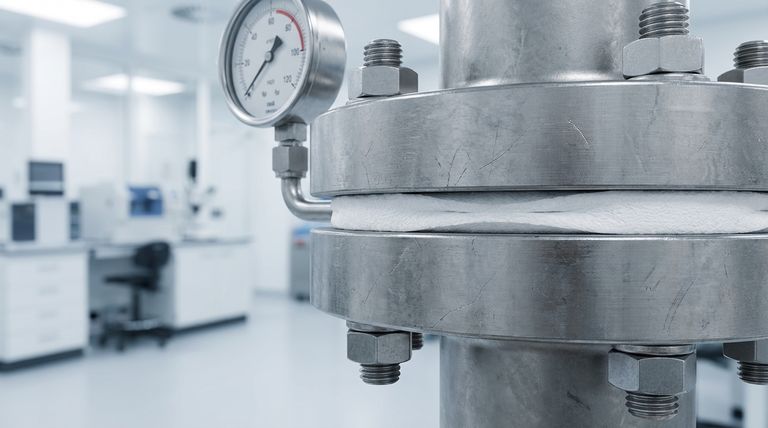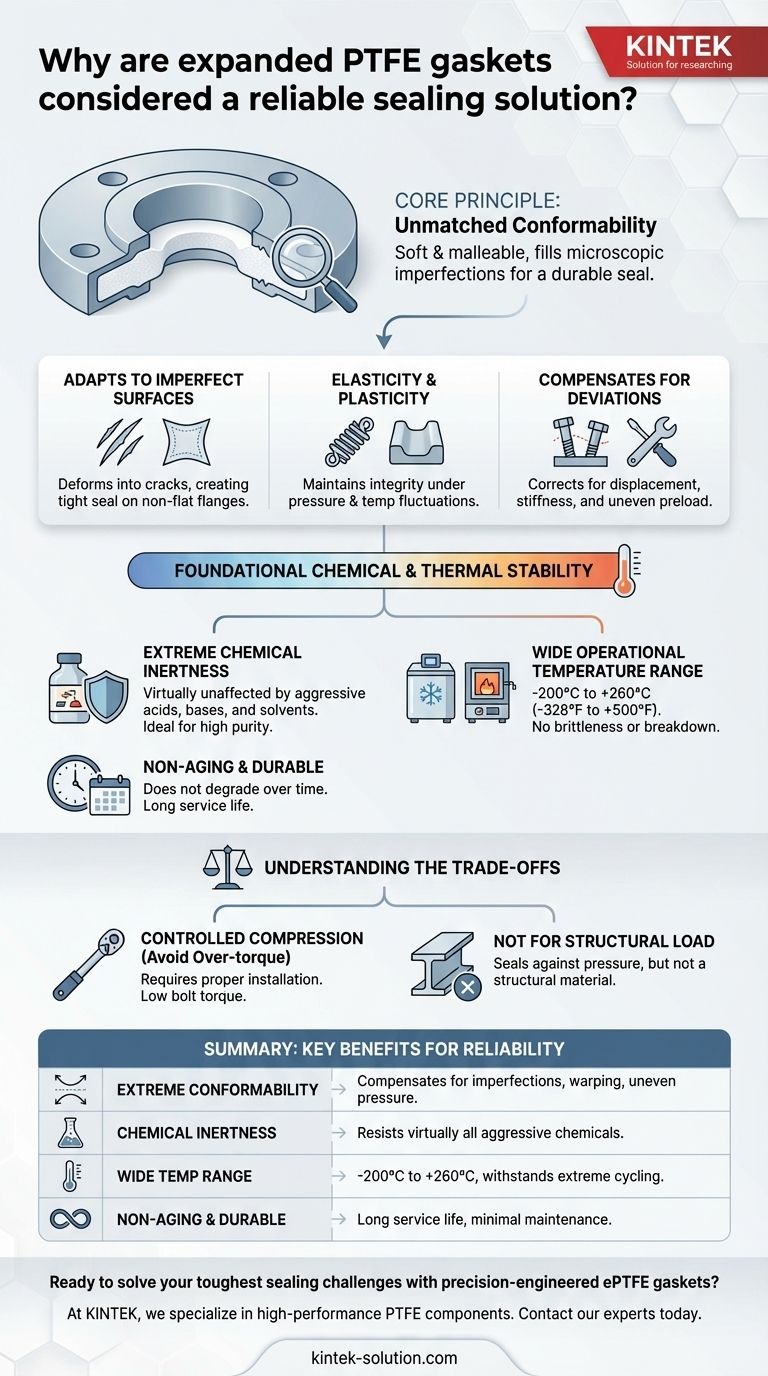At its core, an expanded PTFE (ePTFE) gasket is considered a reliable sealing solution because of its unique combination of extreme chemical inertness, wide temperature stability, and remarkable physical conformability. Unlike more rigid materials, ePTFE is soft and malleable, allowing it to flow into and fill microscopic imperfections on flange surfaces, creating a highly effective and durable seal under a wide range of conditions.
The true reliability of an expanded PTFE gasket comes from its ability to solve real-world problems. It doesn't just resist chemicals and heat; it physically compensates for common industrial challenges like surface irregularities, minor flange warping, and uneven bolt pressure.

The Core Principle: Unmatched Conformability
The primary reason for ePTFE's success is its ability to create a perfect seal on less-than-perfect surfaces. This physical property is what separates it from many other gasket materials.
How ePTFE Adapts to Imperfect Surfaces
Standard industrial flanges are never perfectly flat. They have tiny scratches, machining marks, and can even warp slightly under operational stress.
Expanded PTFE’s soft, fibrous structure allows it to deform and embed itself into these fine cracks and irregularities, creating a tight, leak-proof seal where a harder gasket might fail.
The Role of Elasticity and Plasticity
The material exhibits both good elasticity (the ability to return to its original shape) and plasticity (the ability to be permanently molded).
This combination allows it to adapt to various shapes and sizes of sealing gaps while maintaining sealing integrity, even under high pressure and temperature fluctuations.
Compensating for Real-World Deviations
In practical applications, perfect alignment and even pressure are difficult to achieve. ePTFE’s softness and high compression ratio help compensate for these variables.
It effectively corrects for minor installation displacement, stiffness deformation in the flange, and uneven preload from bolts, ensuring a consistent seal across the entire surface.
Foundational Chemical and Thermal Stability
Beyond its physical properties, ePTFE possesses an inherent stability that makes it suitable for the most demanding industrial environments.
Extreme Chemical Inertness
PTFE is one ofthe most chemically inert materials known. It is virtually unaffected by aggressive acids, bases, and solvents.
This prevents the gasket from degrading or contaminating the process medium, making it an ideal choice for high-purity industries like pharmaceuticals, food processing, and aggressive chemical manufacturing.
Wide Operational Temperature Range
Expanded PTFE gaskets perform reliably across an exceptionally broad temperature spectrum, typically from -200°C to +260°C (-328°F to +500°F).
It does not become brittle in cryogenic conditions or break down at elevated temperatures within this range, ensuring seal integrity during extreme thermal cycling.
Non-Aging and Durable Properties
Unlike many elastomers or organic materials, ePTFE does not degrade over time due to exposure to the elements or operational conditions.
This non-aging characteristic, combined with its self-lubricating low-friction surface, contributes to a long service life and significantly reduces maintenance requirements.
Understanding the Trade-offs
While highly effective, no single material is a universal solution. Understanding the context for ePTFE's use is crucial for ensuring its reliability.
The Importance of Controlled Compression
Expanded PTFE's greatest strength is its softness, but this also means it requires proper installation. It is designed to seal with relatively low bolt torque.
Over-compressing the gasket can cause it to extrude out of the flange, compromising the seal. Always adhere to the manufacturer's torque specifications.
Not a High-Pressure Structural Gasket
While ePTFE effectively seals against high pressure, it is not a structural material. It is not intended to bear heavy mechanical loads in the way a solid metal gasket can.
Its primary function is to create a seal between two surfaces, not to add significant structural rigidity to the joint itself.
Making the Right Choice for Your Application
Selecting ePTFE is a strategic decision based on the specific challenges of your sealing application.
- If your primary focus is sealing older, slightly damaged, or warped flanges: The superior conformability of ePTFE makes it the ideal choice to compensate for surface imperfections.
- If your primary focus is chemical compatibility and process purity: Its extreme inertness ensures it will not react with or contaminate the medium, making it perfect for aggressive or sensitive applications.
- If your primary focus is performance across extreme temperature cycles: The material's vast operational temperature range ensures a reliable seal in both cryogenic and high-heat environments.
Ultimately, choosing an expanded PTFE gasket is an investment in long-term sealing integrity for critical applications where failure is not an option.
Summary Table:
| Key Property | Benefit for Sealing Reliability |
|---|---|
| Extreme Conformability | Compensates for surface imperfections, warping, and uneven bolt pressure. |
| Chemical Inertness | Resists virtually all aggressive acids, bases, and solvents; ideal for high-purity processes. |
| Wide Temperature Range | Performs reliably from -200°C to +260°C, withstanding extreme thermal cycling. |
| Non-Aging & Durable | Long service life with minimal maintenance; does not degrade over time. |
Ready to solve your toughest sealing challenges with precision-engineered ePTFE gaskets?
At KINTEK, we specialize in manufacturing high-performance PTFE components, including seals and gaskets, for the semiconductor, medical, laboratory, and industrial sectors. Our expertise in custom fabrication—from prototypes to high-volume orders—ensures you get a sealing solution tailored to your specific operational demands, flange conditions, and media compatibility.
Invest in long-term sealing integrity and eliminate downtime. Contact our experts today to discuss your application and request a quote.
Visual Guide

Related Products
- Custom PTFE Parts Manufacturer for Teflon Parts and PTFE Tweezers
- Custom PTFE Parts Manufacturer for Teflon Containers and Components
- Custom PTFE Measuring Cylinders for Advanced Scientific and Industrial Applications
- Customizable PTFE Seals Filter Holders for Versatile Applications
- Custom PTFE Square Trays for Industrial and Laboratory Use
People Also Ask
- What are the benefits of Teflon bellow mechanical seals for manufacturers and suppliers? Unlock New Market Opportunities
- What advantages do PTFE spherical balls provide? Unmatched Chemical Resistance & Low Friction
- What post-machining processes can improve PTFE surface finishes? Achieve a Flawless Finish for Your Components
- When might additional lubrication be needed for PTFE applications? Understand the exceptions to the rule.
- What are the primary applications of PTFE bars in the chemical industry? Solve Your Toughest Corrosion Problems
- How do PTFE rotary shaft lip seals benefit the food processing industry? Ensure Hygiene & Reliability
- How do PTFE-lined valves prevent leakage and contamination? Ensure Purity and Protect Equipment
- What are some specialized industrial applications of guide rings? Essential Uses for Oil-Free and High-Load Systems



















